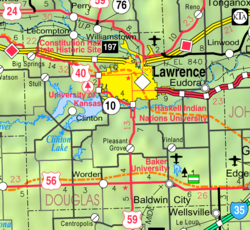Lecompton, Kansas
| Lecompton, Kansas | |
|---|---|
| City | |

Constitution Hall (2009)
|
|
 Location within Douglas County and Kansas |
|
 KDOT map of Douglas County (legend) |
|
| Coordinates: 39°2′35″N 95°23′42″W / 39.04306°N 95.39500°WCoordinates: 39°2′35″N 95°23′42″W / 39.04306°N 95.39500°W | |
| Country | United States |
| State | Kansas |
| County | Douglas |
| Area | |
| • Total | 1.78 sq mi (4.61 km2) |
| • Land | 1.77 sq mi (4.58 km2) |
| • Water | 0.01 sq mi (0.03 km2) |
| Elevation | 919 ft (280 m) |
| Population (2010) | |
| • Total | 625 |
| • Estimate (2012) | 627 |
| • Density | 350/sq mi (140/km2) |
| Time zone | Central (CST) (UTC-6) |
| • Summer (DST) | CDT (UTC-5) |
| FIPS code | 20-39150 |
| GNIS feature ID | 0478805 |
| Website | Lecompton.org |
Lecompton (pronounced /lᵻˈkɒmptən/) is a city in Douglas County, Kansas, United States. As of the 2010 census, the city population was 625.
Lecompton played a major historical role in pre-Civil War America as the Territorial capital of Kansas from 1855 to 1861. This time period was known as Bleeding Kansas.
Lecompton was founded in 1854 and planted on a bluff on the south bank of the Kansas River. It was originally called "Bald Eagle", but the name was changed to Lecompton in honor of Samuel Lecompte, the chief justice of the territorial supreme court. In the spring of 1855, the town became the capital of the Kansas Territory. President James Buchanan appointed a governor and officials to establish government offices in Lecompton, and construction began on an elegant capitol building.
The first post office in Lecompton was established in September, 1855.
In the fall of 1857 a convention met in Constitution Hall and drafted the famous Lecompton Constitution, which would have admitted Kansas as a slave state. The constitution was rejected after intense national debate and was one of the prime topics of the Lincoln-Douglas debates. The controversy contributed to the growing dispute soon to erupt in civil war. The Lecompton Constitution failed, in part, because the antislavery party won control of the territorial legislature in the election of 1857. The new legislature met at Constitution Hall and immediately began to abolish the pro-slavery laws.
...
Wikipedia
